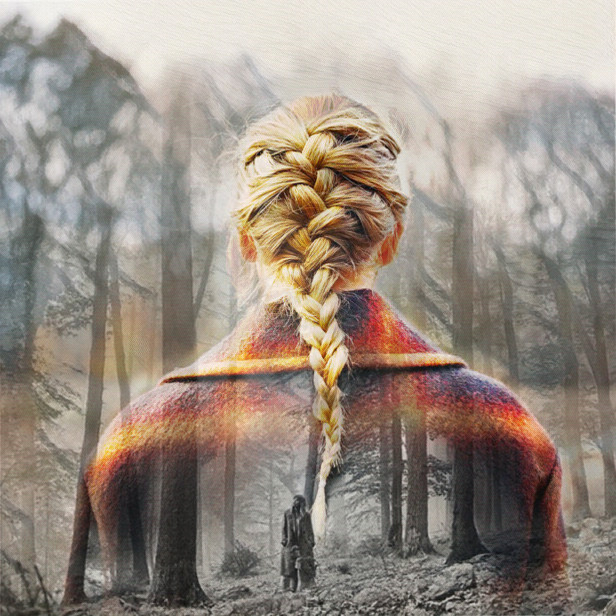The mastermind of Taylor Swift, ever more a transcendent musician
Swift’s career over the past decade or so has been defined by bright, showy music videos and star-studded live performances complete with pyrotechnics and magnificent displays. Current pandemic limitations have obviously altered the entertainment landscape, but Swift’s latest albums are proof that her genius lies not with the flamboyance of Hollywood but with the heart of her success: songwriting.
December 14, 2020
She’s done it again. In the last sixteen months, singer-songwriter and all-around musical vanguard Taylor Swift has released 56 new songs, six music videos, three feature-length films and two albums. And here comes her third.
Two days before her 31st birthday, Swift announced the surprise release of her ninth studio album, her second album in less than five months. Created as a sister album to her July album “folklore,” “evermore” is a continuation of Swift’s deviation from her famous reputation as a pop superstar. Choosing instead to cling closer to her acoustic roots, “evermore” replaces the flashy showstoppers of Swift’s past with cozy and arpeggiated piano, guitar, flute and cello rhythms wrapped in a layer of pure elegance and artistry.
“To put it plainly, we just couldn’t stop writing songs,” she said in a statement on Twitter. “To try and put it more poetically, it feels like we were standing on the edge of the folklorian woods and had a choice: to turn and go back or to travel further into the forest of this music. We chose to wander deeper in.”
Swift’s career over the past decade or so has been defined by bright, showy music videos and star-studded live performances complete with pyrotechnics and magnificent displays. Current pandemic limitations have obviously altered the entertainment landscape, but Swift’s latest albums are proof that her genius lies not with the flamboyance of Hollywood but with the heart of her success: songwriting.
Like “folklore,” Swift brought back familiar faces: like Aaron Dessner of rock band The National, Justin Vernon of Bon Iver, producer and writer Jack Antonoff and her songwriting muse William Bowery, a pseudonym for her current partner Joe Alwyn. And like every album she’s ever released, Swift’s name is featured prominently in every song byline, distinguishing herself from many of her other contemporaries.
Choosing to depart further from her past of solely writing about her own relationship mishaps and successes, “evermore” is a product of isolation and thus a product of fantasy. In “champagne problems”—arguably Swift’s best ballad since “All Too Well” in her 2012 album “Red” and her most striking romantic vignette yet—she brings out her best storytelling as she details a rejected proposal. “no body, no crime” with sister band HAIM is a tribute to Nashville’s narrative devices with a murder mystery triggered by angsty infidelity and jealousy.
Even in her most curated masterpieces, Swift doesn’t venture far before reverting to her classic diaristic ways. “long story short” is her most personal track on the album, delving into the intricacies of her highly publicized drama in 2016 with Kanye West and even passing on a bit of wisdom to her younger self: “Past me / I wanna tell you not to get lost in these petty things / Your nemeses will defeat themselves / Before you get the chance to swing.”
Perhaps Swift’s most powerful tool in her arsenal is her ability to invoke the strongest emotion in her listeners, not so much with her particularly soft vocals but rather with her incredibly vivid imagery of ultimate sadness, grief and heartbreak. In admittedly my favorite line of the entire album in “tolerate it,” she sings, “I made you my temple, my mural, my sky / Now I’m begging for footnotes in the story of your life.”
In a touching track mirroring the song “epiphany” in “folklore” about her grandfather, Swift delivers a devastating eulogy to her late grandmother in “marjorie.” And continuing to stay true to the sisterhood between “folklore” and “evermore,” she pulls a bit from the love triangle in the former and fabricates the story of “dorothea,” a Hollywood actress who returns home to find someone who’s been waiting for her all along.
It’s no surprise that some of her best songs on the album—”champagne problems,” “coney island” and “evermore”—are co-written by Alwyn, a testament to her ever-changing transformation from country princess to pop celebrity to now: a settled 31-year-old whose introspective questioning and consistent self-reflection have established an exceptional musical legacy that’s managed to make its way into every corner of our songful imaginations.
All of “evermore,” ranked:
- champagne problems
- coney island (feat. The National)
- tolerate it
- long story short
- gold rush
- evermore (feat. Bon Iver)
- marjorie
- no body, no crime (feat. HAIM)
- ’tis the d— season
- happiness
- cowboy like me
- ivy
- willow
- dorothea
- closure


















![“[Building nerf blasters] became this outlet of creativity for me that hasn't been matched by anything else. The process [of] making a build complete to your desire is such a painstakingly difficult process, but I've had to learn from [the skills needed from] soldering to proper painting. There's so many different options for everything, if you think about it, it exists. The best part is [that] if it doesn't exist, you can build it yourself," Ishaan Parate said.](https://harkeraquila.com/wp-content/uploads/2022/08/DSC_8149-900x604.jpg)




![“When I came into high school, I was ready to be a follower. But DECA was a game changer for me. It helped me overcome my fear of public speaking, and it's played such a major role in who I've become today. To be able to successfully lead a chapter of 150 students, an officer team and be one of the upperclassmen I once really admired is something I'm [really] proud of,” Anvitha Tummala ('21) said.](https://harkeraquila.com/wp-content/uploads/2021/07/Screen-Shot-2021-07-25-at-9.50.05-AM-900x594.png)







![“I think getting up in the morning and having a sense of purpose [is exciting]. I think without a certain amount of drive, life is kind of obsolete and mundane, and I think having that every single day is what makes each day unique and kind of makes life exciting,” Neymika Jain (12) said.](https://harkeraquila.com/wp-content/uploads/2017/06/Screen-Shot-2017-06-03-at-4.54.16-PM.png)








![“My slogan is ‘slow feet, don’t eat, and I’m hungry.’ You need to run fast to get where you are–you aren't going to get those championships if you aren't fast,” Angel Cervantes (12) said. “I want to do well in school on my tests and in track and win championships for my team. I live by that, [and] I can do that anywhere: in the classroom or on the field.”](https://harkeraquila.com/wp-content/uploads/2018/06/DSC5146-900x601.jpg)
![“[Volleyball has] taught me how to fall correctly, and another thing it taught is that you don’t have to be the best at something to be good at it. If you just hit the ball in a smart way, then it still scores points and you’re good at it. You could be a background player and still make a much bigger impact on the team than you would think,” Anya Gert (’20) said.](https://harkeraquila.com/wp-content/uploads/2020/06/AnnaGert_JinTuan_HoHPhotoEdited-600x900.jpeg)

![“I'm not nearly there yet, but [my confidence has] definitely been getting better since I was pretty shy and timid coming into Harker my freshman year. I know that there's a lot of people that are really confident in what they do, and I really admire them. Everyone's so driven and that has really pushed me to kind of try to find my own place in high school and be more confident,” Alyssa Huang (’20) said.](https://harkeraquila.com/wp-content/uploads/2020/06/AlyssaHuang_EmilyChen_HoHPhoto-900x749.jpeg)







